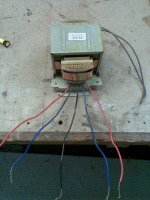I pulled the transformer below out of a old Yamaha amp that I had, but didn't pay any attention to how it was wired (wasn't planning on using it at the time). It has (output wires) 2 blue 2 red & 1 black wire, I assume the reds are active, blues neutral but have no idea what the black is for, unless it's the neutral, then what are the blues for 
I was going to plug it in & see what the multi meter said but don't want to go & get my wire's crossed
Can any one help me please
David
I was going to plug it in & see what the multi meter said but don't want to go & get my wire's crossed
Can any one help me please
David
Attachments
I'm guessing this is a power transformer. The black is probably the center-tap connection, usually connected to the circuit's "common" (ground, neutral, return, etc). The blue pair probably provides one voltage - such as, e.g., 15 volts for the low-level stages. If so, the two red wires are probably "anti-phased" with respect to each other. Similarly, the red pair would provide a different voltage - such as 30 or 40 volts for the output stages.
(If the above guess is correct, the remaining question is whether the red and blue windings are entirely separate except for a common center-tap connection, or whether the low-voltage windings are actually a tap on the high-voltage windings.)
In a case like this it's almost always safe to apply a low AC voltage - say, 6 volts from a filament transformer, or 15 volts from a bell transformer - to the primary (I'm guessing that's the gray/brown wires) and measure the secondary voltages. If everything is OK, the secondary voltages will increase proportionately when full line-voltage replaces the low-voltage excitation. If there are shorted or open windings, the low test voltage will limit damage or injury.
Dale
(If the above guess is correct, the remaining question is whether the red and blue windings are entirely separate except for a common center-tap connection, or whether the low-voltage windings are actually a tap on the high-voltage windings.)
In a case like this it's almost always safe to apply a low AC voltage - say, 6 volts from a filament transformer, or 15 volts from a bell transformer - to the primary (I'm guessing that's the gray/brown wires) and measure the secondary voltages. If everything is OK, the secondary voltages will increase proportionately when full line-voltage replaces the low-voltage excitation. If there are shorted or open windings, the low test voltage will limit damage or injury.
Dale
I've got a similar Yammie transformer and it's exactly as dchisholm posted.
Wire it up as said if possible.
If it came out of something that was working at your house voltage then you may be ok to just wire it to your ac input if you don't have the capability of doing what dchisholm stated.
Just be on guard and if there is any smoke unplug immediately or you could blow house fuses if transformer is shorted.
Wire it up as said if possible.
If it came out of something that was working at your house voltage then you may be ok to just wire it to your ac input if you don't have the capability of doing what dchisholm stated.
Just be on guard and if there is any smoke unplug immediately or you could blow house fuses if transformer is shorted.
- Status
- This old topic is closed. If you want to reopen this topic, contact a moderator using the "Report Post" button.
